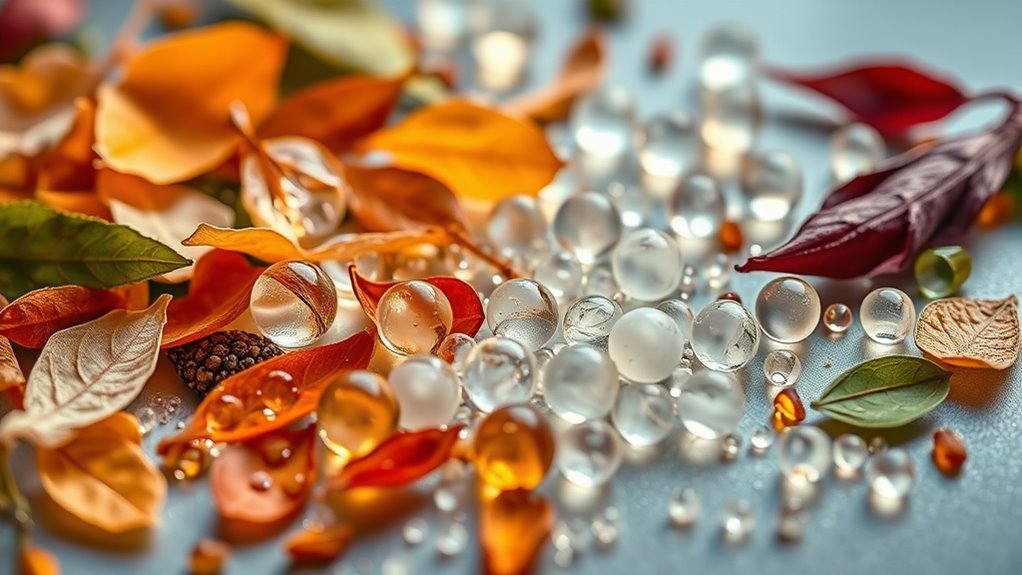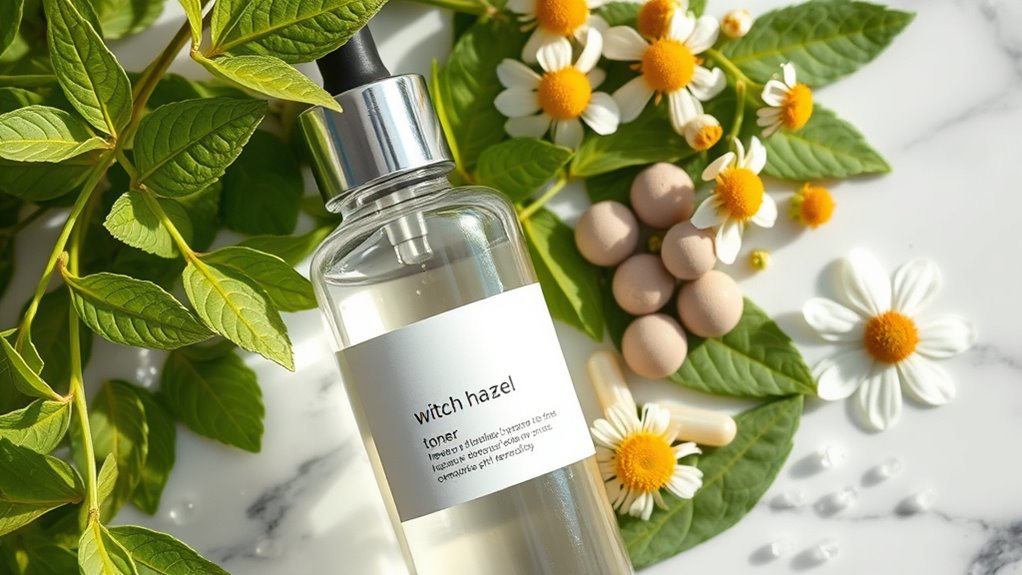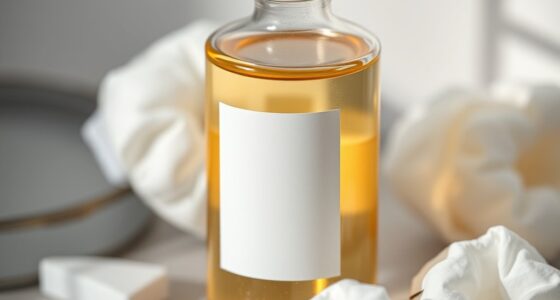A toner ingredient glossary covers essentials like hyaluronic acid, which hydrates, and witch hazel, an astringent that tightens pores. Humectants attract moisture, while botanical extracts soothe irritation and provide antioxidants. pH balancers like apple cider vinegar help maintain skin’s natural acidity. Active components like salicylic or glycolic acid exfoliate and clarify. Understanding these ingredients helps you choose the right toner for your skin. Keep exploring to discover how each element can benefit your skincare routine.
Key Takeaways
- Hyaluronic acid is a powerful humectant that attracts moisture, keeping skin hydrated and plump after toning.
- Witch hazel is an astringent that tightens pores and reduces oiliness, ideal for oily or acne-prone skin.
- Natural extracts like chamomile soothe irritation, calm redness, and provide antioxidant benefits in toners.
- pH-balancing ingredients such as apple cider vinegar help maintain the skin’s natural acidity for healthier skin.
- Exfoliating acids like salicylic and glycolic acid remove dead skin cells and promote clearer, smoother skin.

Understanding the ingredients in toner products can seem overwhelming, but knowing what each component does helps you make informed choices for your skincare routine. One of the most common and beneficial ingredients found in toners is natural extracts. These plant-based components, like chamomile, witch hazel, or green tea, provide soothing, anti-inflammatory, and antioxidant properties that support healthy skin. Natural extracts help calm irritation, reduce redness, and protect against environmental stressors. They’re especially popular in formulations aimed at sensitive or irritated skin because they work gently yet effectively.
Natural extracts like chamomile, witch hazel, and green tea soothe, calm, and protect sensitive skin effectively.
Another essential aspect to *ponder* is how toners influence your skin’s pH balance. Your skin’s natural pH hovers around 4.5 to 5.5, slightly acidic, which helps protect against bacteria and environmental pollutants. Many toners contain ingredients that help restore or maintain this delicate pH balance after cleansing, preventing dryness or overproduction of oil. When your skin’s pH is balanced, it’s better equipped to absorb subsequent skincare products and stay resilient against irritants. Look for ingredients like witch hazel or apple cider vinegar, which can help restore this balance, especially if your skin tends to be oily or prone to breakouts.
As you explore toner ingredients, you’ll notice that some contain humectants like hyaluronic acid or glycerin. These ingredients draw moisture into your skin, ensuring hydration even after cleansing. Combining humectants with natural extracts helps create a toner that not only cleanses but also nourishes and plumps your skin. Meanwhile, ingredients like alcohol or certain astringents may be included to tighten pores and reduce oiliness, though they can sometimes be drying. It’s important to pay attention to the formulation and choose products that align with your skin type and concerns.
Other common ingredients like salicylic acid or glycolic acid serve specific purposes such as exfoliating dead skin cells or deep-cleaning pores. These are particularly useful if you deal with acne or dullness. However, it’s *paramount* to use them in moderation to avoid irritation. When selecting a toner, consider how these actives work together with natural extracts and pH-balancing ingredients to create a balanced, effective product. By understanding what each ingredient does, you can tailor your skincare routine to support your skin’s unique needs, ensuring you get the most benefit from every application.
Frequently Asked Questions
Are Toner Ingredients Suitable for Sensitive Skin Types?
Yes, toner ingredients can be suitable for sensitive skin if you choose hypoallergenic formulations. Look for products with gentle, soothing ingredients like hyaluronic acid or witch hazel. Always do an ingredient patch test before fully incorporating a new toner into your routine to avoid reactions. By selecting products designed for sensitive skin and testing them first, you can minimize irritation and enjoy the benefits without discomfort.
Can Toner Ingredients Cause Allergic Reactions?
Imagine your skin as a delicate garden; certain toner ingredients can sometimes act like unexpected weeds, causing minor annoyances. You might experience fragrance sensitivities or preservative reactions, which are subtle signs of allergic responses. While most ingredients are gentle, some can trigger reactions if you’re sensitive. Always check labels, perform patch tests, and choose products suited for sensitive skin to avoid any unwelcome surprises.
How Do Natural Ingredients Compare to Synthetic Ones?
Natural ingredients often seem safer than synthetic ones because they’re derived from nature, but that’s not always true—some natural components can cause allergies or irritation. Synthetic ingredients are usually tested for safety and stability. When choosing between natural vs synthetic, consider ingredient safety, your skin type, and any sensitivities. Always read labels carefully to understand what’s in your toner and opt for products that suit your skin’s needs.
What Ingredients Should I Avoid in Toners?
You should avoid toners with alcohol, as it has drying effects that can irritate your skin, especially if you have sensitive skin. Fragrance sensitivities are common, so steer clear of toners containing added fragrances or parfum, which can cause redness or allergic reactions. Look for gentle, alcohol-free options with soothing ingredients, and always check labels to make certain you’re not exposing your skin to potential irritants or allergens.
Do Toner Ingredients Differ for Oily Versus Dry Skin?
Yes, toner ingredients differ for oily versus dry skin. For oily skin, you should look out for pore-clogging ingredients and avoid high alcohol content, which can dry out skin and cause irritation. For dry skin, opt for hydrating ingredients like hyaluronic acid and avoid harsh alcohols that strip moisture. Tailoring your toner helps balance your skin’s needs and prevents issues like excess oil or dryness.
Conclusion
Now that you know the key ingredients in toners, you can choose products that truly benefit your skin. Whether it’s hydrating hyaluronic acid or soothing witch hazel, understanding these ingredients empowers you to make smarter skincare decisions. Isn’t it worth investing in products that nourish and protect your skin? By knowing what’s inside, you can create a routine that leaves you feeling confident and refreshed every day. Your skin deserves that kind of care.
Claire has a knack for turning complex dermatological concepts into engaging, easy-to-understand articles. Her work primarily focuses on creating detailed reviews and thought-provoking articles in the “Vetted” category. Claire’s writing not only informs but also inspires our community to try new skincare solutions.










